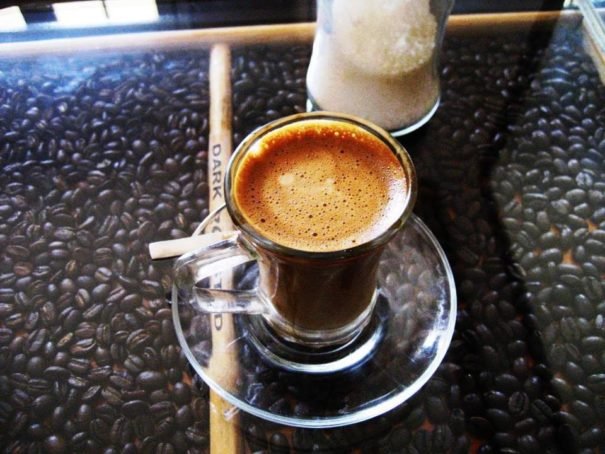
Sugar Is OK But Milk Is a Pollutant: A Coffee Debate

Sugar Is OK But Milk Is a Pollutant: A Coffee Debate
Macchiato in Addis Ababa
A couple of years ago I went to Legahar in the middle of the Ethiopian capital, Addis Ababa, to find out whether the old French-built railroad would take me to Djibouti Ville, the capital of neighboring Djibouti.
The name Legahar is derived from la gare, the French word for train station. The two nations’ flags fluttered atop the quaint, dilapidated, pale yellow building. In fractured Amharic I struggled to explain my quest, but was informed that alas, the trains linking the two cities no longer ran. I was invited to visit the museum instead, where I stumbled upon an unexpected but highly informative coffee section amid the gare memorabilia.
Coffee is Ethiopia’s gift to the world. The legend goes something like this. Around A.D. 800, in the country’s southwest, a goatherd named Kaldi noticed that the berries of a certain shrub made his goats dance, so he, too, tried some. Finding himself thrilled in more ways than one, he gamboled his way to the nearby monastery to share his discovery where the outraged abbot denounced the berries as things of the devil and summarily flung them into a fire. A pleasant aroma emanated from the embers, prompting the curiosity of the monks. They gathered the roasted berries and proceeded to brew what was presumably the world’s first cup of coffee. That night, they found themselves “uncannily alert to divine inspiration,” according to a board on a wall of the gare museum bearing the title “The African Origins of Coffee.”
My taxi driver, Getachew, outlined the finer points of buna brewing and consumption as we sat in his ramshackle blue Lada. Buna is the Amharic word for coffee. The coffee beans have to be freshly roasted, ground via pestle and mortar, then boiled and served ba jebena, in a clay jar. Sugar is permissible, but Getachew the purist looked at me as if I had stabbed him in the heart when I ‘polluted’ my buna with wetet: milk. He strongly disapproved of my preference for machine-brewed, milk-infused coffee. Only the macchiato—stained with a miserly drop of wetet—met with his approval.
I sat in the Legahar cafe and sipped my robust macchiato. Musing on these architectural and culinary vestiges of European imperialist incursion, I wondered what the forthcoming shiny new Chinese-built trains would bring.